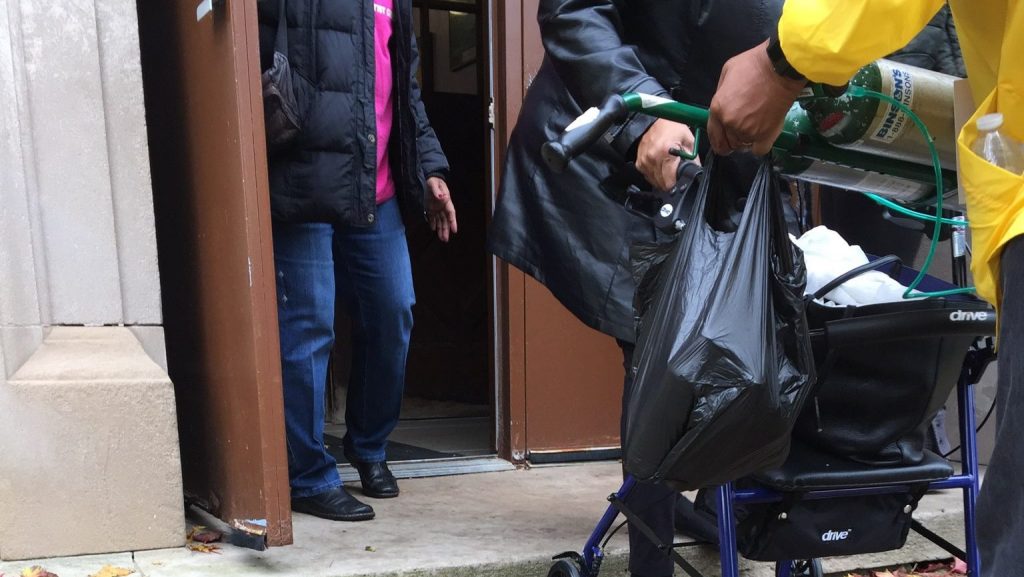Created Equal: Polling locations are largely inaccessible for disabled voters in metro Detroit. Why?
David Leins August 28, 2024Dessa Cosma and Christopher Ali joined Stephen Henderson to discuss democratic participation and the lack of equitable access to voting and information in Detroit.

A person using a walker tries to navigate steps through a doorway at a Detroit polling location.
Editor’s note: A previously uploaded version of this episode included incorrect audio from an earlier episode about grief and loss.
A staggering amount of metro Detroit’s polling stations are not accessible for disabled people — 84%, according to a 2022 audit by Detroit Disability Power.
Subscribe to Created Equal on Apple Podcasts, Spotify, Google Podcasts, NPR.org or wherever you get your podcasts.
Another, less visible, barrier to democratic participation is equitable access to information. Yet nearly half of Detroit households don’t have broadband access.
That picture only gets worse when you account for household income.
Voting sites inaccessible
There were four criteria Detroit Disability Power used in their audit to define accessibility at a polling location:
- An accessible parking area with a clear pathway into the building
- A fully accessible voter assist terminal (VAT)
- An accessible entrance into the building
- An accessible booth for casting paper ballots privately
Dessa Cosma from Detroit Disability Power says that being able to vote in-person without barriers is a democratic issue, but the state of polling location accessibility now is not acceptable.
“I can tell you as a disabled voter, it is frustrating and demoralizing and dehumanizing to go exercise my right to vote and realize that people weren’t prepared for me to show up,” Cosma said. “When they were thinking about who mattered and people they needed to set up their day for, I wasn’t on their list.”
Detroit Disability Power plans to conduct another audit of metro Detroit’s polling locations for the general election in November.
Internet access
Democratic acts such as voting, accessing a city hall website, attending virtual public meetings, or contacting representatives are all reliant on having internet access.
Detroit is among the worst-connected cities in the nation, with nearly 40% of homes without a broadband connection.
But access to broadband internet is only one of three pillars of digital equity, says Christopher Ali, telecommunications research at Penn State University. The other two pillars are affordability and skillset.
“The internet is our window to the world right now. It’s how we get news and information […] it’s how we engage with the many of the governmental services we need to do on a daily basis. It’s how we book the COVID vaccine and apply for benefits and file our taxes,” Ali said.
Cosma and Ali both joined Created Equal on Wednesday to discuss equitable access to voting and information.
Guests:
- Dessa Cosma is the executive director of Detroit Disability Power
- Christopher Ali is the Pioneers Chair in Telecommunications and professor of telecommunications in the Bellisario College at Penn State. Ali is the author of “Farm Fresh Broadband: Politics of Rural Connectivity.”
Listen to Created Equal with host Stephen Henderson weekdays from 9-10 a.m. ET on 101.9 WDET and streaming on-demand.
Trusted, accurate, up-to-date.
WDET strives to make our journalism accessible to everyone. As a public media institution, we maintain our journalistic integrity through independent support from readers like you. If you value WDET as your source of news, music and conversation, please make a gift today.
Author
-
 David Leins is the senior producer of WDET’s daily news and culture program, The Metro. He has produced several award-winning podcasts and multimedia series at WDET including Tracked and Traced, Science of Grief and COVID Diaries, which earned a National Edward R. Murrow Award for Excellence in Innovation. He previously led WDET’s StoryMakers program. David has an M.A. in Media Arts and Studies from Wayne State University, and a B.A. in anthropology from Grand Valley State University with a minor in Arabic. David teaches podcasting at Wayne State University and is an alumnus of the Transom Audio Storytelling Workshop.
David Leins is the senior producer of WDET’s daily news and culture program, The Metro. He has produced several award-winning podcasts and multimedia series at WDET including Tracked and Traced, Science of Grief and COVID Diaries, which earned a National Edward R. Murrow Award for Excellence in Innovation. He previously led WDET’s StoryMakers program. David has an M.A. in Media Arts and Studies from Wayne State University, and a B.A. in anthropology from Grand Valley State University with a minor in Arabic. David teaches podcasting at Wayne State University and is an alumnus of the Transom Audio Storytelling Workshop.
